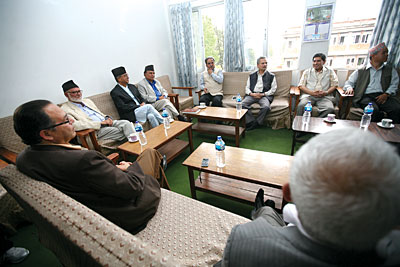 |
Consensus, the joke goes, is the most overused word in Nepali politics. In the last two years alone, if you were to be paid a rupee each time the word was mentioned in the press, you would be a billionaire by now. All political leaders talk about the need for consensus. Most end speeches calling for consensus. Yet a lack of it is about to bring the country to a standstill this weekend and beyond, making life difficult for millions of Nepalis, and enlarging the dark cloud of uncertainty over Nepal.
How then to unravel this apparent paradox: that the greater calls for consensus have not led to it? For an answer, it's instructive to look at the anatomy of negotiations that take place in Nepal.
Compromise seen as a sign of weakness: Whoever said that politics is the art of the possible never took account of the psyche of the Nepali politician. Our politicians' world-view is that giving an inch to the other party under any circumstance is a sign of weakness, and one that is equated with a loss of face within one's own group and the larger political landscape.
It does not matter whether the other side can be persuaded to give a little as well, so that, over time, both parties can make progress towards a middle ground. This sort of all-or-nothing behaviour hardens positions instead, sets a bad precedent, and makes future negotiations all the more difficult. Unless a fresh set of leaders take over our political parties (and it's increasingly unclear how new leadership will come about) to sweep away these cobwebs of hardened positions, chants for consensus are just that: chants.
No common frame of reference: Most of our political conversations share little common frame of reference besides the fact of our being Nepali � an identity which is itself under assault at present.
In the West, politicians lasso their soaring rhetoric around what's right for their countries' youth and children, who, as everyone knows, make up the generation that's coming next. The booming economies of China and India have given their politicians and the citizens a dose of self-confidence to realise that their countries matter on the global stage.
But in a country where half the population of 27 million citizens is 20 or under (i.e. not even born at the time of Jana Andolan 1), so divorced are politicians from the concerns of the youths and children, or for that matter, from the concerns of the voters, that there is not much of a common national reference for them to refer to when they negotiate with one another to push work ahead.
Vague phrases like 'New Nepal' can only go so far as a common reference before confusing everyone. And in an electoral system which, by design, makes elected representatives disproportionately more accountable to their party leaders than to the voters that elected them, few politicians have to worry about having to face the wrath of the voters come the next election cycle.
Is it any wonder that frustrated by some politicians' penchant for holding the entire country hostage time and again, most civil society pundits are reduced to practically begging those politicians to improve their behaviour? Cut off from both the voters and the future of the country, the politicians have every incentive to focus only on their immediate self-interest, which they will work towards at any cost.
It's time for those who talk about consensus to start talking about the underlying dysfunctional anatomy of our political negotiations. Only then will we begin to come up with ideas for moving ahead. Otherwise, chanting for consensus will just become another diversionary slogan.
READ ALSO:
They're here, by Prshant Jha - From issue #500 (30 April - 6 May 2010)



